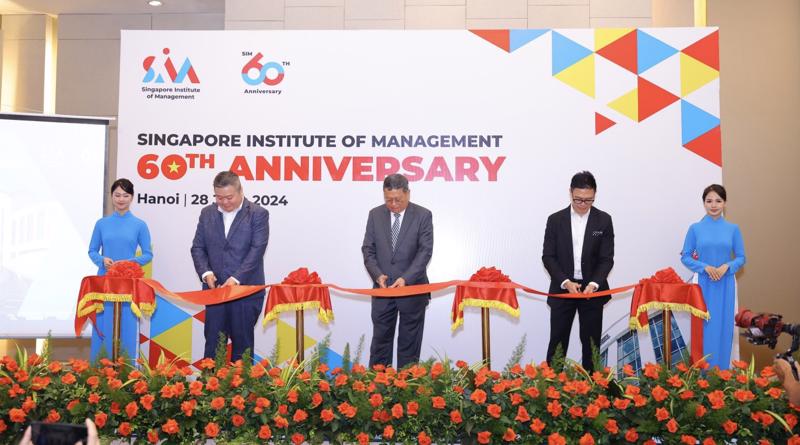The Singapore Institute of Management (SIM), one of Asia’s leading education and lifelong learning institutions, signed MoUs with Duy Tan University, FPT Schools, the Olympia Schools, and Ispace Cyber Security College during its 60th anniversary celebrations on June 28 in Hanoi.
SIM will bring Duy Tan University students the opportunity to continue their studies with SIM in Singapore, where they will receive globally-recognized academic qualifications.
With its other partners, SIM will promote, identify, and present scholarship opportunities and study tour programs at SIM for their students.
At the signing event, SIM also revealed a rebranded identity, to reflect a new industry-focused and skills-based era of lifelong learning. The new look comes as many industries have undergone a well-documented rapid transformation brought about by accelerated technological innovation, increased automation, and a heightened need to be agile and adapt to the external environment.
Commenting on the rebrand, Mr. Gerald Lum, Director, Brand, Marketing & Communications at SIM, said it has been at the forefront of encouraging lifelong learning and upskilling Singapore’s and the region’s workforce since its inception 60 years ago.
“Our mission is to foster resilient, resourceful, and responsible individuals who are highly employable,” he explained. “By maximizing human capital potential, we create a positive multiplier effect when they enrich the communities and organizations they serve, in turn shaping a brighter future for society.”
Vietnamese learners make up 15 per cent of the overall foreign student population at SIM. There are currently more than 1,400 Vietnamese alumni.
“SIM’s learners and alumni will have access to complimentary and subsidized micro-credential courses from October 2024 to March 2025,” said Mr. Lum. “These courses cover career-ready skills to secure dream jobs, essential core skills to enhance work performance, and cutting-edge digital modules. Upon completion, learners will earn digital badges which enhance their employability.”
As part of SIM’s 60th anniversary, the Overseas Alumni Chapter (OAC) for Hanoi was also launched. SIM currently has six OACs, which are an extension of its support for its alumni to facilitate ongoing learning and upskilling as they progress in their careers. The Hanoi chapter is the second in Vietnam, following the well-established chapter in Ho Chi Minh City.
SIM’s refreshed identity is timely as Vietnam is implementing a movement to promote lifelong learning from 2023 to 2030. Vietnam’s constantly evolving economy will require its workforce be equipped with lifelong skills, as they need to be both agile and resilient - a vision shared by SIM’s refreshed identity to ensure that learners are primed for the future. The country’s young population underscores its importance as a key growth market for SIM, with its rapidly developing higher education landscape, technological advancements, economic growth, and dynamic job market.
Professor Wei Kwok Wee, Provost at SIM Global Education, also said these initiatives support SIM’s purpose of nurturing minds for lifelong learning. “By providing pathways for learners from all backgrounds, such as our scholarships and bursaries, we also create social impact by contributing towards a more equitable society through access to quality education,” he added.
SIM also launched its new Representative Office in Hanoi, transitioning from its previous location in Ho Chi Minh City.
The move aims to provide consolidated support for learners in Vietnam, helping them make informed decisions about transnational education.
Established in 2019, the Representative Office in Vietnam has been dedicated to delivering positive outcomes for the community. It organizes an annual Educators Conference to engage educators on a larger scale, facilitating dialogue and sharing best practices and insights on the education landscape in Vietnam, Singapore, and the region.
It also collaborates with local and multinational enterprises to enhance educational opportunities.
Key for Vietnam to attract investment in new fields
Human resources is among the important factors for Vietnam to be able to attract investment in new fields such as AI, high technology, digital transformation, and green transformation, according to Mr. Lum.
The World Economic Forum’s Future of Jobs 2023 report predicts that 44 per cent of workers’ core skills will change in just the next five years.
“Growing attention to sustainability and the global adoption of advanced technologies are expected to create 69 million new jobs, but will also cost 83 million jobs, corresponding to a net deficit of 14 million jobs,” said Mr. Lum. “Therefore, continuing to study and improve skills is extremely necessary to ensure that we are capable of meeting current and future jobs.”
Since 5-7 years ago, when the term AI began to be mentioned globally, training units have confirmed the importance of this factor in the future and implemented research and training of human resources in accordance with new trends.
According to Mr. Lum, the move of the Vietnamese Government as well as many countries around the world shows that continuously upgrading skills and learning has become a new trend, and employers also expect that new graduates will be fully equipped with knowledge and job-ready skills. This means that focusing only on accumulating knowledge and academic theories is no longer appropriate.
Commenting the importance of new factors, Mr. Lum said that, currently, digital technology has become extremely important for many countries, and possessing high-quality human resources that meet these trends will boost competitiveness. “Vietnam should seize the opportunity to create high-quality human resources to attract investment resources in areas that will become trends in the future, such as digital transformation and green transformation,” he added.









 Google translate
Google translate